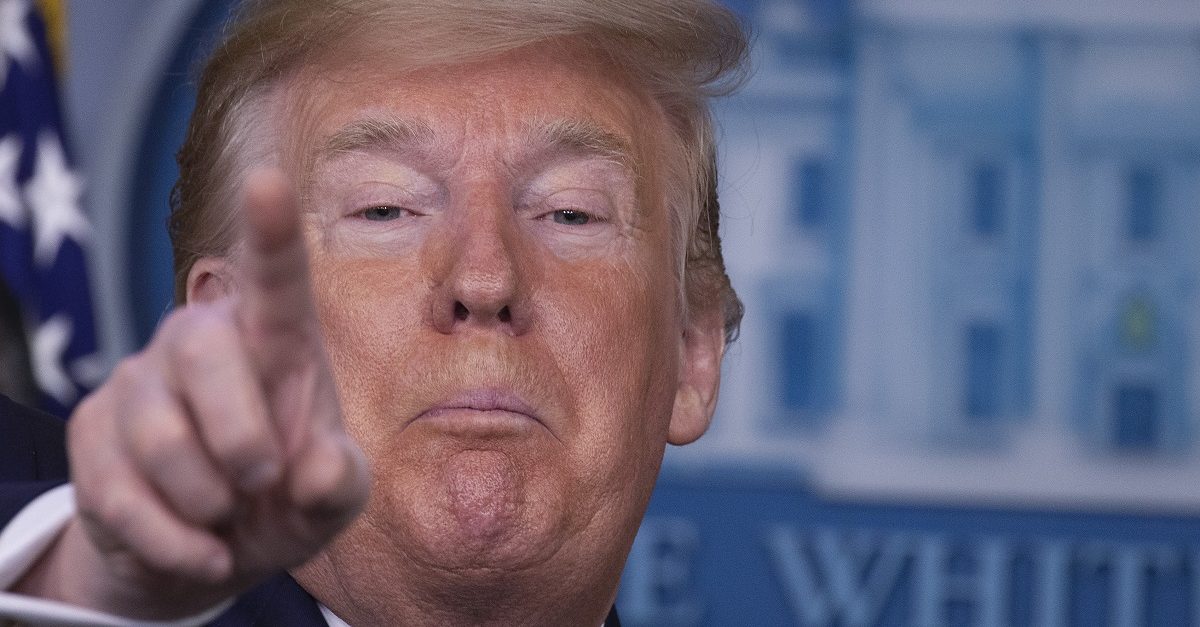
If you were paying attention closely to what happened when President Donald Trump signed the historic coronavirus stimulus bill into law, news of acting Department of Defense (DoD) Inspector General Glenn Fine’s removal on Tuesday would not have come as a shock.
Fine was recently named the chair of the Pandemic Response Accountability Committee, a role with great oversight authority over stimulus spending:
Fine will oversee a board of fellow inspectors general, all responsible for monitoring their respective departments. They include the Departments of Education, Health and Human Services, Homeland Security, Justice, Labor, as well as the Treasury, the Small Business Administration and the Treasury Inspector General for Tax Administration.
Fine’s authority will be expansive. He can issue subpoenas and lead investigations of those in and outside the government, including executives accepting federal aid. Fine’s job as committee chair is to help “prevent waste, fraud, and abuse” of the more than $2 trillion the U.S. is spending on recovery.
President Trump made clear from the get-go that he was not going to regard such oversight as legitimate.
On March 27, when Trump signed the bill into law, he also issued a signing statement. The statement said that Trump’s administration would override a provision in the nearly 900-page stimulus bill that would require the country’s newest inspector general–just created and tasked with overseeing the disbursement of the stimulus funds–to report to Congress any time the administration stonewalled about where or how those funds were being spent.
“Section 4108 of [the bill] establishes a new Inspector General for Pandemic Recovery (SIGPR) within the Department of the Treasury to manage audits and investigations of loans and investments made by the Secretary of the Treasury under the Act,” the signing statement said. “Section 4018(e)(4)(B) of the Act authorizes the SIGPR to request information from other government agencies and requires the SIGPR to report to the Congress ‘without delay’ any refusal of such a request that ‘in the judgment of the Special Inspector General’ is unreasonable.”
Then came the administration’s policy stance:
I do not understand, and my Administration will not treat, this provision as permitting the SIGPR to issue reports to the Congress without the presidential supervision required by the Take Care Clause, Article II, section 3.
The removal of Fine appears to represent, more or less, the same idea. Acting IG of the Environmental Protection Agency (EPA) Sean W. O’Donnell will replace Fine.
Fine also made some noise in recent months about whistleblower reprisal at the DoD. As recently as January, Fine said Pentagon officials failed to punish people who retaliated against whistleblowers.
“Recently, we’ve seen a disturbing trend of the DOD disagreeing with the results of our investigation or not taking disciplinary action in whistleblower reprisal cases without adequate or persuasive explanations,” Fine told the House Oversight and Reform Committee. “Failure to take action sends a message to agency managers that reprisal will be tolerated and also to potential whistleblowers [that they] will not be protected.”
Fine said that his office could only investigate allegations of whistleblower retaliation and make recommendations based on their findings, but explained that it was up to those in managerial positions at the Pentagon to discipline employees.
“We’re not judge and jury,” he said. “We ought to provide transparency on when this happens, and then people ought to be asked about this. Hearings are good. Questions are good.”
This is notable in light of President Trump’s high-profile firing of Intelligence Community Inspector General Michael Atkinson. Atkinson was the Trump appointee who took the Ukraine whistleblower’s complaint seriously and decided it should be disclosed to Congress.
Atkinson’s ouster last Friday was met with outcry from Department of Justice Inspector General Michael Horowitz and from Atkinson himself. Not long after the dust settled, Trump swiftly moved to install new inspectors general at various agencies. One of those nominees is Brian D. Miller, who would fill the Special Inspector General for Pandemic Recovery role that the administration has already knee-capped.
On Tuesday, Trump ratcheted up a fight with yet another inspector general: Principal Deputy Inspector General of the Department of Health and Human Services (HHS) Christi Grimm.
Grimm put together a report on Monday about “Hospital Experiences Responding to the COVID-19 Pandemic.”
Colin Kalmbacher and Jerry Lambe contributed to this report.
[Image via Tasos Katopodis/Getty Images]
Have a tip we should know? [email protected]